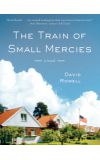
14 Oct 2011 09:04:14
The day is June 8, 1968, a Saturday when the body of U.S. Sen. Robert F. Kennedy is carried by train from New York City to Washington for burial at Arlington National Cemetery. Hundreds of thousands — estimates ranged well past 1 million — lined the route to pay homage to the presidential candidate assassinated two days earlier.
David Rowell recreates the day through vivid portraits of a range of characters, black and white, young and old, whose mostly humdrum and ordinary lives turn on events as they set out to watch the train pass.
Each of their stories, told in staggered vignettes that begin that morning, unfold in modest, commonplace settings and revolve around familiar hopes, fears, schemes and family dynamics.
A domestic drama, for example, plays out between two middle-class couples around an aboveground backyard swimming pool at a home in Delaware. A young man who lost a leg in Vietnam is interviewed at his family home in Maryland by a fledgling newspaper reporter, with their shared memories of the soldier's high school sweetheart raising tensions.
The period is captured in part by the constant offstage presence of the Kennedys, including the pregnant widow, Ethel Kennedy. Cultural icons of the 1960s are referenced; when a man thinks an auburn-haired, statuesque woman in a bikini looks like a movie star, the one he thinks of is Raquel Welch.
As Rowell draws the reader into these lives, the pulse of the book quickens. A young girl teeters dangerously atop a jungle gym as her mother's day of little lies falls apart. Will a boy playing games with his buddies get up from the railroad tracks in time as the Kennedy train roars into view?
The novel becomes more than the sum of its stories. With a deft touch and an eye for telling detail, Rowell creates a memorable mosaic of America, circa 1968. It was a year of searing events, including the assassinations of Kennedy and the Rev. Martin Luther King Jr., but Rowell turns to the quiet, unassuming people who didn't make headlines to leave the poignant lasting impressions of his fiction.
Rowell, an editor at The Washington Post Magazine who has published short fiction, has said he was inspired by the collection of images taken by Paul Fusco, a Look magazine photographer aboard the train. Fusco kept his camera on the throngs gathered by the tracks down the Eastern seaboard and took hundreds of pictures of the people.

